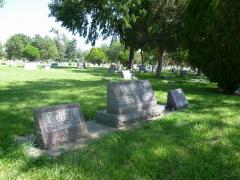- 2011-08-04 (Thu) 09:33
- Random thoughts
Now I’ve spent a few days in Garden City, Kansas. The object of coming here was to see this city and the neighboring town, called Holcomb. Holcomb was once, I guess, a household name to many American people in 1960’s. It was a place where the notorious murders had happened in November of 1959, which was highlighted in “In Cold Blood,” a novel, or rather in a new literary genre of “nonfiction novel,” named by the writer himself, Truman Capote.
On the morning of Sunday of Nov. 15, 1959, all the four Clutter family members were found dead at their home, brutally murdered. At first it was investigated more likely as a crime of hate or vengeance. But the family, which consisted of a hardworking farmer, Herb, his sick and warm-hearted wife, Bonnie, a 16-year old beautiful and kind girl, Nancy, whom literally everybody in the neighborhood loved, and her younger brother, Kenyon, were “the last people you would ever murder” according to their neighbors.
After the news had spread all over the US, Capote came to Holcomb to write a “piece” for The New Yorker. He was accompanied with his childhood and loyal friend, Nelle Harper Lee, author of “To Kill a Mocking Bird.” For some time the investigations headed by detective Al Dewey ran into difficulties and seemed to go to a maze. However with luck they could eventually arrest two parole breakers, Perry Smith, 31, and Richard Hickock, 28, on the end of that year. Capote had been fascinated by the development of the case. Thus he had followed it for the next 5 years or so, interviewing many people in Holcomb and Garden City, including the two criminals.
The case turned out to be a failed burglary. According to their confessions, when he was still in prison, Richard heard from a cellmate that Herb Clutter had kept a safe, as being a very wealthy farmer. He then decides to raid the house and steal the money from the safe and kill all the eyewitnesses. He lured Smith, with whom once he was a cellmate, as he had thought him a ruthless man capable to do killings easily.
It turned out to be so. Perry massacred all 4 members singlehandedly whereas Richard could not join him in the murders. Yes, Perry could be a ruthless man at times, but one cannot forget the fact that he had to go through miserable childhood days without the love of his divorced parents. Dewey and Capote seem to share a feeling that “Perry possessed a quality, the aura of an exiled animal, a creature walking wounded.” They were sentenced to death at a Garden City court. After more than 5 years since their arrest, in April of 1965 they were executed while being watched by invited guests, among whom, Capote and Dewey. Dewey could not feel any “sense of climax, release, of a design justly completed,” which he had imagined at the final execution.
In Garden City I have had another “Midwest hospitality.” Sharon who works for Finney County Historical Museum drove me around the city and to the Clutter house in Holcomb. She eventually took me to Finney County Public Library. People there gave me related files on the saga. I feel like almost obliged to speak up to my folks back in Japan, “Hey, if you plan to visit the US by any chance, think of extending the trip to the Midwest region, be it from the West coast or from East coast.”
Now back to the book. It was produced from a horrific case of murders of a whole of innocent and very respectable family at Holcomb. The shock had sent the local residents here into “until then unthinkable thing to do” according to Sharon. “Locking the doors.” Even after 47 years of its publication, not a few residents here regard the book as something not worthy of talking, let alone reading. But the fact remains, I think, that it is a beautifully and powerfully written novel.

The last paragraph of the book goes like following. It is a scene at a graveyard in Garden City, called Valley View Cemetery, where the Clutter family is buried. Here Dewey happens to see another girl he met in the course of the investigation, Suzan. She was a very close friend of Nancy. She comes to the cemetery “once in a while,” she tells to Dewey. And she departs after a chat.
“And nice to have seen you, Sue. Good luck,” he called after her as she disappeared down the path, a pretty girl in a hurry, her smooth hair swinging, shining—just such a young woman as Nancy might have been. Then, starting home, he walked toward the trees, and under them, leaving behind him the big sky, the whisper of wind voices in the wind-bent wheat.
As if looking at a beautifully drawn picture. Oh, I’ve almost forgotten to add that the residents in Garden City and Holcomb might be locking the doors of their homes, but their hearts are wide open to the visitors.
(photo: The Clutter family’s gravestone in Valley View Cemetery)
- Newer: Mark Twain experience
- Older: Bumpy reading







